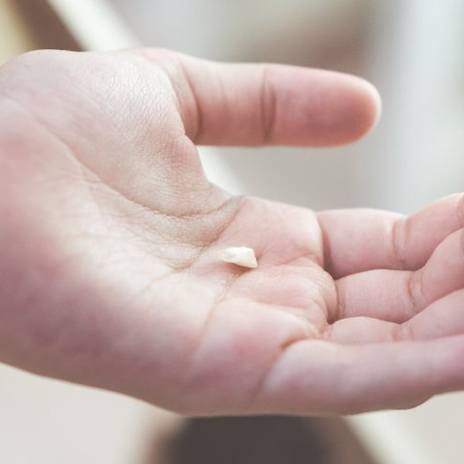Wisdom Tooth Extractions – Alpharetta, GA
Eliminate Pain and Prevent Complications
Many teens and adults need to have their wisdom teeth removed, but we understand that doesn’t necessarily make the process less scary. Rest assured, our team will make sure you’re as comfortable as possible during your treatment and can provide nitrous oxide sedation if necessary. To eliminate oral pain and prevent future complications, contact our office and schedule your consultation today.
Why Choose Alpharetta Modern Dentistry for Wisdom Tooth Extractions?
- Dr. V Is Experienced With Surgical Extractions
- We Partner With CareCredit For Flexible Financing
- Same-Day & After-Hours Emergency Treatment
What Are Wisdom Teeth?

Basically, wisdom teeth are “third molars” that develop in the very back of the mouth between the ages of 17 and 25. Not everyone has wisdom teeth, though many young adults do grow at least one. It’s possible to have as many as four wisdom teeth – one for each quadrant of the mouth.
Why Do Wisdom Teeth Need to Be Removed?

Wisdom teeth often (but not always) need to be removed for one of the following reasons:
- There’s not enough space in the mouth to accommodate the molar
- It becomes fully or partially impacted (trapped below the gumline)
- The growing molar is pushing against nearby teeth or damaging the jawbone
When left unaddressed, these issues can cause complications like oral pain, dangerous cysts, infection, dental misalignment, and tooth decay. If at all possible, it’s best to avoid these problems altogether by extracting your third molars.
What to Expect from the Wisdom Teeth Procedure

Sometimes we can simply extract wisdom teeth the same way we would for any other pearly white: by applying a local anesthetic to the treatment area and gently prying it free.
However, in cases of impaction, Dr. V will likely have to remove the molar surgically. To do this, she’ll apply an anesthetic, make a small incision in your gumline, cut the tooth into pieces, then carefully remove them from your mouth.
After examining your oral cavity and taking X-rays, we’ll be able to tell you which method to expect.
Recovering From Wisdom Teeth Extraction

Shortly after we extract your wisdom teeth, a blood clot will form over the now-empty socket. This protects the space from bacteria and painful sensations, so it’s important to keep the clot intact! You’ll have to follow specific instructions during your recovery, such as:
- Avoiding strenuous activity
- Letting liquid waterfall out of your mouth instead of spitting
- Managing any bleeding with gauze
- Drinking without a straw
- Elevating your head when lying down
- Avoiding hard and crunchy foods
- Taking OTC pain relievers as needed
Wisdom Tooth Extractions FAQs
How Should I Prepare for My Wisdom Tooth Extraction?
We discussed what you should and shouldn’t do during the recovery period above, but is there anything you need to know about the weeks leading up to your procedure? The short answer is “yes!” First, you shouldn’t smoke, drink alcohol, or eat lots of sugary foods. Second, you should arrange for someone you know and trust to drive you to and from your appointment. Third, you should buy everything you need to heal comfortably at home, including soft foods, over-the-counter pain medication, and cold compresses.
Is Wisdom Tooth Removal Painful?
Since the first step of wisdom tooth surgery is always to numb your mouth with local anesthetic, we can confidently say the answer is “no.” Of course, after you return home and you start to regain sensation in your mouth, it’s normal for some soreness and sensitivity to arise. That’s where the aftercare instructions come in. Even something as simple as using a cold compress and not using a straw can make a big difference in how quickly and comfortably you recover.
Should Wisdom Teeth Be Removed If They Don’t Hurt?
It is very common for impacted wisdom teeth to result in chronic jaw pain. However, there are other reasons our dentist in Alpharetta may recommend having yours extracted, including if their presence dramatically increases your risk of growing a cyst or developing an infection. Ultimately, if yours have the potential to negatively impact your oral or overall health, we will recommend an extraction, even if you aren’t experiencing any pain or discomfort at the current moment.
How Soon Can I Eat After Wisdom Teeth Removal?
Immediately following the procedure, the gauze pads need to stay in place to slow down the bleeding. Plus, you shouldn’t eat anything while your mouth is still numb. For these two reasons, we recommend waiting at least an hour.
Important reminder: Even after the bleeding slows down and the numbing agent wears off, you need to avoid sugary, acidic, sticky, and crunchy foods. Instead, stick to a soft foods diet consisting of cottage cheese, plain yogurt, applesauce, vegetable broth, and the like.
When Can I Use a Straw After Wisdom Teeth Removal?
We mentioned in a previous section that you shouldn’t use a straw. This is important because the suction force can dislodge the blood clot, causing a dry socket. So, wait until you get the green light from our dental team. Usually, it’s safe to do so around the 3-day mark, but we encourage you to get in touch with us if you have any questions or concerns so we can help.
How Do You Sleep After Wisdom Teeth Removal?
To prevent sleeping after your procedure from becoming a challenge, we will provide you with a list of aftercare instructions. It’s of the utmost importance that you follow them to a tee – from keeping your head elevated to eating only extremely soft foods. If you can, have a trusted adult stay with you as well so they can check on you and bring you anything you need throughout the night to remain comfortable.
